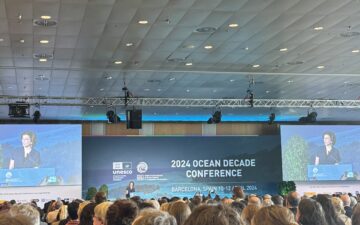Keeping up with the news from home is pretty easy thanks to modern technology and the ability to access good, accurate content. That doesn’t mean the news is always easy to take in—as we all know. Reading the 16 April edition of Yale e360, I was struck by the quotation that should be good news about our proven ability to generate economic benefits from limiting or eliminating harm from human activities. And yet, there seems to be a trend in the wrong direction.
“The Clean Air Act of 1970, for example, cost $523 billion over its first 20 years, but produced $22.2 trillion in benefits for public health and the economy. ‘It’s become very clear that most of these environmental regulations are hugely net-beneficial for society,” one policy expert tells Conniff [article author], ‘If we don’t put these regulations in place, we as a society are leaving money on the table.”
The benefits to the ocean of pollution prevention are incalculable—just like our benefits from the ocean. What goes into the air winds up in our waterways, our bays and estuaries, and the ocean. In fact, the ocean has absorbed one third of the carbon dioxide and other emissions over the past two hundred years. And it continues to generate up to half of the oxygen we need to breathe. However, the long decades of absorbing the emissions from human activities are having an effect on the chemistry of the ocean—not only making it less hospitable to life within, but also having the potential to adversely affect its ability to generate oxygen.
So here we are celebrating five decades of making sure those who profit from activities that generate pollution actually participate in preventing pollution, so that the health and other environmental costs are mitigated. Yet, it is hard to celebrate our past success in having economic growth and environmental benefits, because it appears that a kind of amnesia is spreading.

In the past few weeks, it would appear that those in charge of safeguarding our air quality have forgotten how good air quality benefits our economy. It would appear that those in charge of safeguarding our health and well-being have ignored all of the data that shows how many more people get sick and die in areas where air pollution is greatest—all during a pandemic of a deadly respiratory illness that has underscored those economic, social, and human costs. It would appear that those in charge of safeguarding our health and well-being have forgotten that mercury in our fish represents a serious and avoidable health hazard to those who eat fish, including humans, birds, and other creatures.
Let us not retreat from the very rules that have made our air more breathable and our water more drinkable. Let us remember that whatever the costs of limiting pollution from human activities, the costs of NOT limiting them are far greater. As the EPA website states, “(f)ewer premature deaths and illnesses means Americans experience longer lives, better quality of life, lower medical expenses, fewer school absences, and better worker productivity. Peer-reviewed studies show that the Act has been a good economic investment for America. Since 1970, cleaner air and a growing economy have gone hand in hand. The Act has created market opportunities that have helped to inspire innovation in cleaner technologies – technologies in which the United States has become a global market leader.” https://www.epa.gov/clean-air-act-overview/clean-air-act-and-economy
Furthermore, dirtier air and dirtier water harm the plants and animals with whom we share this planet, and which are part of our life support system. And, instead of restoring abundance in the ocean, we will further deteriorate her ability to provide the oxygen and other priceless services on which all life depends. And we lose our leadership in protecting air and water that has served as the template for environmental laws around the world.







